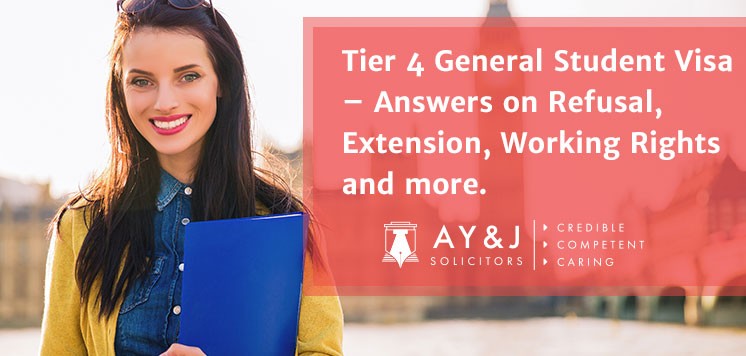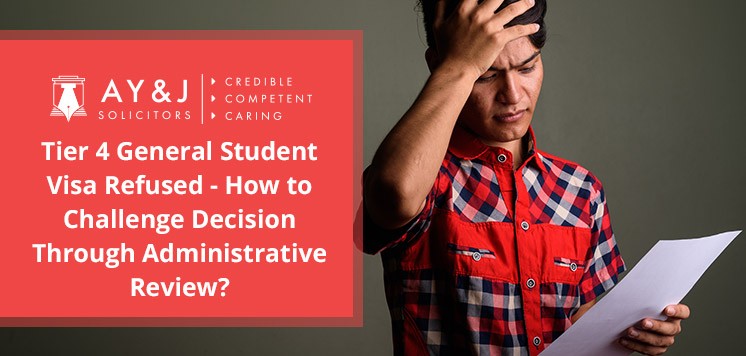Disclaimer: The information in this blog is accurate as of its publication date. Any updates after that date are not reflected here.
Tier 4 General Student Visa is the category that allows a student to come and gain an education in the UK. British educational establishments are continuing to see high demand for places from overseas non-EEA students, with 307,540 making the journey to study in the last year. While the numbers are slightly lower than previous years, they are markedly higher than 2012/13 (at just under 300,000). Around 42% of those studying at post-graduate level are from outside of the EU. Students from China make up the largest proportion coming to the UK (95,090), with the United States, Hong Kong, India, and Malaysia being the next most popular nations.
In this article, we will answer some of the common questions we receive regarding the Tier 4 (General) Student Visa from prospective applicants from across the world.
What does the Points-based (PBS) System Mean to Those Applying for a Tier 4 (General) Student Visa?
The application system for the Tier 4 (General) Student Visa is points based, which means that you must meet a minimum number of points to be eligible. Thankfully, the PBS system for students is quite straightforward; points are awarded for:
- Holding a valid Confirmation of Acceptance for Studies (CAS) from a fully licenced Tier 4 sponsor
- Having sufficient funds for your course fees and living expenses
- Meeting the English language requirements
What are the Common Grounds for Refusal of Tier 4 (General) Student Visa?
When applying for your Tier 4 (General) Student Visa, it is important not to fall foul of one of the many potential reasons for refusal, which include:
- Not meeting the points requirements as outlined above – there is unlikely to be an exception to this
- If you have already completed a study in the UK which would take you over the maximum duration caps – speak to us if you are unsure of the rules on this
- Previous immigration history – e.g. overstaying your visa
- False representation – i.e. if one or more of your documents are deemed non-genuine
- Non-disclosure of material facts
- Medical Grounds
It is important to remember that even if you are refused, the decision may be incorrect, and may, therefore, be challenged, by way of administrative review or judicial review.
Client says, “My application for Tier-4 Entry Clearance was refused. The caseworker counted ‘suspended sentence’ as a form of imprisonment and said my future application will be refused for ten more years.
Senior Immigration Solicitor of A Y & J Solicitors submitted the Administrative Review to UKBA and proved the decision to be incorrect.
The AR was successful and the original decision to refuse Entry Clearance was revoked. I received the Tier-4 Visa and entered the UK without any issue”.
If I wish to Remain in the UK After my Tier 4 (General) Student Visa Ends, What Should I Do?
Many students, having spent several years in the UK, wish to make their time in the country more permanent. If you would like to remain the UK after your study, you will need to switch to an alternative visa type, which will not only allow you to stay for a further duration but may also count towards permanent settlement.
There is a range of possible visas you can switch to (subject to eligibility), including Tier 2 (General) Visa or a Tier 1 Entrepreneur Visa.
Alternatively, if you are getting to the end of a PhD, a Tier 4 doctoral extension can provide you with a further 12-months to look for employment or set up a new business.
If you have already secured a job in the UK, you can apply for a Tier 2 (General) Visa, if you have a certificate of sponsorship (COS) from a Tier 2 licenced employer.
Other options include the Tier 5 Youth Mobility, UK Ancestry Visa, Tier 1 Exceptional Talent, and Tier 1 Investor.
Client says, “I visited A Y & J Solicitors for an initial consultation for my Tier 1 Entrepreneur application in December 2013. I was advised on the requirements of this application in detail. I was fully satisfied and confident with the knowledge & experience of the adviser. A Y & J Solicitors is fully equipped with the resources to prepare Tier 1 entrepreneur application. [perfectpullquote align=”left” bordertop=”false” cite=”” link=”” color=”” class=”” size=””]A Y & J Solicitors’ brilliant knowledge, quick turn around on my query has amazed me.[/perfectpullquote]A Y & J Solicitors’ brilliant knowledge, quick turn around on my query has amazed me. I am very impressed to receive my Tier 1 entrepreneur visa in just 24 days. I strongly believe that meticulous paperwork and strong legal representation from A Y & J Solicitors has achieved quick result for me. I was told by other law firms that getting Tier 1 Entrepreneur from Tier 1 Post Study Work is a nightmare but it is not true with A Y & J Solicitors’ help”.
Can I work on Tier 4 (General) Student Visa?
If you are sponsored by a recognised Higher Education Institution, for most full-time degree-level and above courses, you will be permitted to work for a maximum of 20 hours per week – whether paid or unpaid. In addition, during term holidays, you will be able to work full-time. For courses below degree level, you are most likely to be restricted to working for less than ten hours per week. For those studying part-time, or with a publicly funded college, or private provider, you may be unable to undertake any employment.
Can I Bring my Family with me to the UK on Tier 4 (General) Student Visa?
As a student in the UK, you may be able to bring dependent family members with you; however, there are criteria you must meet. Dependents are classified as a husband, wife, or civil partner, an unmarried or same-sex partner, or your children under 18.
To bring your dependents with you, you must be:
- Sponsored by a higher education institution on a course at level seven (as defined by the Ofqual register) or greater, for a course of study that is one year or more
- A new government-sponsored student on a course that lasts longer than six months
- A Doctorate Extension Scheme student
It is important to note that you will need to provide evidence you have sufficient funds to support your family with you in the UK, including the cost of the Healthcare Surcharge for each individual applying for entry.
Our expert team dedicated to helping International students with their UK immigration matter, so they can fulfil their dream of studying in the UK. We have achieved many positive results, even when an application is refused after the interview.
A Y & J Solicitors are specialists in immigration law based in central London. If you would like to have more information, please contact us at contact@ayjsolicitors.com or call +44 20 7404 7933.
Disclaimer: No material/information provided on this website should be construed as legal advice. Readers should seek an appropriate professional advice for their immigration matters.








